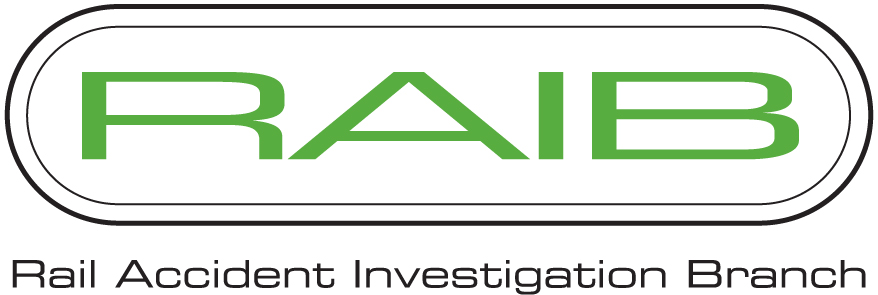Information on the Memorandums of Understanding (MoU) - leaflet 5
Published 1 December 2006
1. Background
Information on the Memorandums of Understanding (MoU) between the Rail Accident Investigation Branch (RAIB) and the British Transport Police, the Association of Chief Police Officers (ACPO), the Association of Chief Police Officers (Scotland)(ACPO(S)), the Crown Office and Procurator Fiscal Service and the Office of Rail Regulation (ORR).
The aim of these MoUs is to ensure effective investigation of rail accidents in the United Kingdom whilst maintaining the independence of all parties and reinforcing the importance of close co-operation between RAIB, the UK’s Police Services, and ORR.
- A RAIB investigation, police investigation, and ORR investigation will progress in parallel with maximum co-operation at all times.
- There should be early contact and close co-operation between RAIB, the police, and ORR throughout their respective investigations, both on and off site.
- Other than to preserve life or prevent further damage and in the absence of clear evidence that serious criminality caused the accident, no person is permitted to access the site of a rail accident without the prior agreement of a RAIB inspector.
- RAIB inspectors must be allowed access to an accident site without delay and to any preserved evidence and wreckage.
- RAIB and the police will liaise and agree the overall evidence collection plan, and evidence will be shared, except for RAIB’s witness statements and other details covered by legal restrictions on disclosure.
2. Rail Accident Investigation Branch (RAIB)
RAIB is based in both Farnborough and Derby and is independent of the:
- government
- railway industry
- safety authorities
- prosecution bodies.
It is part of the Department for Transport (DfT), but is functionally independent and the Chief Inspector reports on accident investigation directly to the Secretary of State.
RAIB investigates serious accidents and incidents occurring on:
- The national railway networks in Great Britain and Northern Ireland
- The Channel Tunnel (in co-operation with its equivalent operation in France)
- The London and Glasgow Underground systems and other metro systems
- Tramways
- Heritage railways (including narrow-gauge systems over 350mm gauge)
- Cable-hauled systems of 1km or longer.
3. The Powers of RAIB and its inspectors
The powers of RAIB and its inspectors – and the framework for reporting and investigating accidents – are set out in the Railways and Transport Safety Act 2003 and the Railways (Accident Investigation and Reporting) Regulations 2005.
RAIB’s inspectors have power to:
- Enter railway property, land or vehicles without warrant
- Seize anything relating to the accident or incident and make records
- Require access to and disclosure of records and information
- Require people to answer questions and provide information about anything relevant to the investigation.
4. RAIB’s Role
RAIB is the independent railway accident investigation organisation for the whole of the UK. The sole objective of any RAIB investigation is to determine the causes and circumstances of accidents and produce a public report of the investigation containing any recommendations to improve railway safety.
RAIB is not a prosecuting body and its investigations are focused solely on safety improvement and do not apportion blame or liability.
5. Precedence of investigations
In the absence of a clear indication that serious criminality[footnote 1] has caused the accident RAIB will normally have precedence in respect of the investigation and will assume lead responsibility for the investigation. Where there is a clear indication that serious criminality caused the accident, it will normally be appropriate for the police investigation to take precedence. Any decision to this effect will be agreed between the police (and, in Scotland, where appropriate, procurators fiscal) and RAIB inspectors in co-operation with each other.
6. Witnesses and Evidence
6.1 Interviewing of Witnesses
RAIB inspectors will normally interview persons before the police or ORR. This will enable RAIB to carry out independent no blame interviews. RAIB, the police and ORR will liaise, as appropriate and practicable, to co-ordinate witness interviews.
- On occasion, the police may require to exercise their power to detain a person who is a suspect in the criminal investigation and this action may be required prior to any interview of the suspect by RAIB. The police, where practicable, will normally co-ordinate this detention with RAIB. Where it is not practicable to do this, the police will notify RAIB of this action as soon as possible after the action.
- In respect of any investigation, formal RAIB statements or records of interview obtained during RAIB-led interviews are non-disclosable unless the High Court (or equivalent) directs, in the public interest, otherwise.
- Relevant police statements will be shared with RAIB inspectors for the purpose of furthering its investigation.
6.2 Handling of evidence
RAIB’s inspectors have responsibility for the examination, collection, retention and analysis of technical evidence in which other parties may have an interest. Where this is the case, RAIB will maintain the necessary evidential trail in accordance with mutually understood principles of handling and sufficiency of evidence. Whilst RAIB will facilitate a joint examination of evidential material, no unilateral examination is to be undertaken without the agreement of all relevant parties.
-
‘Serious criminality’ includes the crimes of murder and culpable homicide, and any criminal act which result in a terrorist incident, deaths, multiple casualties, serious injury and/or other serious consequences, e.g. derailment of a train, or a train collision. This does not include criminal offences which properly fall to be investigated by the Office of Rail Regulation. ↩

